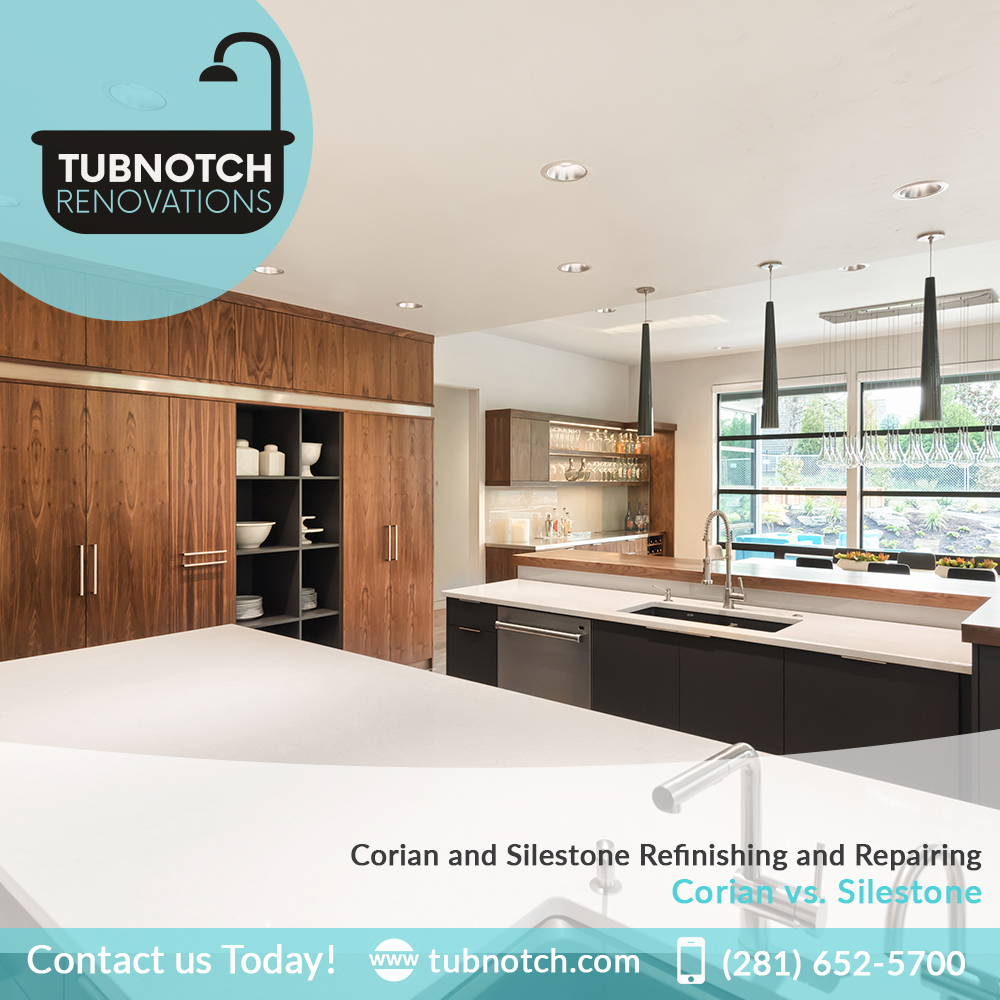
Corian and Silestone Refinishing and Repairing
Corian vs. Silestone: How Do These Manmade Surfaces Compare?
Corian and Silestone are often mentioned in the same breath when discussing kitchen countertop materials, as if they were just different brands of the same type of material.
How do these two popular countertop surfaces compare?
Bottom Line
Corian and Silestone are vastly different; they do not even belong in the same category. While both are quality products, Corian falls in the category of solid surface materials while Silestone belongs in the engineered stone (i.e., "quartz") category.
Composition: What Are They Made Of?
One area of concern among homeowners is whether the product is deemed "natural" or "plastic." Of the two, Corian would be the more "plastic" product, but not by much.
Based on technical data, Silestone has roughly 28% more minerals than Corian. Other than the idea that one--Corian--has more polymers than the other, Silestone's greater mineral content does not matter much in terms of performance and appearance.
Corian - Made of about 33% acrylic resin (PolyMethyl MethAcrylate) and about 66% natural minerals chiefly derived from bauxite. Bauxite is the same ore from which aluminum is extracted.
Silestone - 94% natural quartz, with the remainder devoted to binding resins. Silestone is sometimes erroneously referred to as granite. It is not. Granite countertops are quarried straight from the earth and cut into slabs. Silestone is an aggregate.
Porosity and Stain Resistance: How Permeable Are They?
No countertop material completely resists staining.
But Corian and Silestone both do a reputable job by resisting CLASS I reagents:
Corian - Corian demonstrates low porosity, absorbing 0.1 – 0.7% of its weight as defined by DIN ISO 4586 T7 standards. Corian resists stains from CLASS I reagents, which are things like ketchup, blood, olive oil, tomato sauce, coffee (by contrast CLASS II reagents are things like drain cleaners and paint removers and these substances should not come into contact with Corian.
Silestone - Silestone states that one reason for choosing quartz (crystallised silicon dioxide) as the primary material is because it is extremely hard and resists acids. Like Corian, Silestone resists staining from the CLASS I reagents, and more.
Warranty: How Long Does the Company Stand Behind the Product?
Both DuPont (Corian) and Cosentino (Silestone) offer warranties:
Corian - 10 year limited.
Silestone - 15 year limited.
Source: ThePruce
TubNotch Renovations offers not only utility/functionality but also elegance. Our unequivocal and affordable refinishing, repairing, resurfacing and replacement options that give you the new surfaces for your old bath tub/shower liner and kitchen/bathroom counter tops.

Corian vs. Silestone: How Do These Manmade Surfaces Compare?
Bathtub refinishing and repairing in houston, Bathroom refinishing and repairing in houston, Tile Shower refinishing and repairing, Shower Pan refinishing and repairing, Bathroom Vanity refinishing and repairing, Porcelain tub refinishing and repairing, Fiberglass Bathtub refinishing and repairing, Acrylic Bathtub refinishing and repairing, Clawfoot Bathtub refinishing and repairing, Countertop refinishing and repairing, Laminate Countertops refinishing and repairing, Formica Countertops refinishing and repairing, Tile Countertops refinishing and repairing, Corian and Silestone refinishing and repairing, Bathroom Vanity refinishing and repairing, vanity top refinishing and repairing, ceramic sink refinishing and repairing, kitchen countertop refinishing and repairing, Granite countertop refinishing and repairing, Ceramic Tile refinishing and repairing, Tile Countertops refinishing and repairing, Tile Walls refinishing and repairing, Tile Shower refinishing and repairing, Shower Pan refinishing and repairing, Tile Floors refinishing and repairing, Tiled kitchen refinishing and repairing, Ceramic floors refinishing and repairing, Porcelain finish refinishing and repairing














